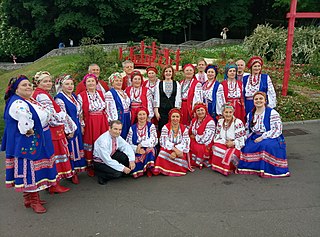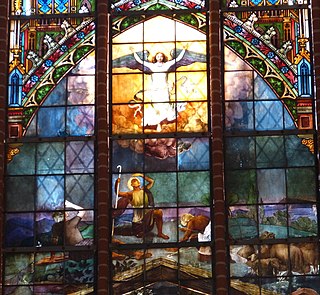Related Research Articles

Sir John Barbirolli was a British conductor and cellist. He is remembered above all as conductor of the Hallé Orchestra in Manchester, which he helped save from dissolution in 1943 and conducted for the rest of his life. Earlier in his career he was Arturo Toscanini's successor as music director of the New York Philharmonic, serving from 1936 to 1943. He was also chief conductor of the Houston Symphony from 1961 to 1967, and was a guest conductor of many other orchestras, including the BBC Symphony Orchestra, London Symphony Orchestra, the Philharmonia, the Berlin Philharmonic and the Vienna Philharmonic, with all of which he made recordings.

A Christmas carol is a carol on the theme of Christmas, traditionally sung at Christmas itself or during the surrounding Christmas holiday season. The term noel has sometimes been used, especially for carols of French origin. Christmas carols may be regarded as a subset of the broader category of Christmas music.

Daphnis et Chloé is a 1912 symphonie chorégraphique, or choreographic symphony, for orchestra and wordless chorus by Maurice Ravel. It is in three main sections, or parties, and a dozen scenes, most of them dances, and lasts just under an hour, making it the composer's longest work. In effect it is a ballet, and it was first presented as such. But it is more frequently given as a concert work, either complete or excerpted, vindicating Ravel's own description above.

Hansel and Gretel is an opera by nineteenth-century composer Engelbert Humperdinck, who described it as a Märchenoper. The libretto was written by Humperdinck's sister, Adelheid Wette, based on the Grimm brothers' fairy tale of the same name. It is much admired for its folk music-inspired themes, one of the most famous being the "Abendsegen" from act 2.

Sir Herbert Hamilton Harty was an Irish composer, conductor, pianist and organist.

King Arthur, or The British Worthy, is a semi-opera in five acts with music by Henry Purcell and a libretto by John Dryden. It was first performed at the Queen's Theatre, Dorset Garden, London, in late May or early June 1691.

Dame Isobel Baillie,, néeIsabella Douglas Baillie, was a Scottish soprano. She made a local success in Manchester, where she was brought up, and in 1923 made a successful London debut. Her career, encouraged by the conductor Sir Hamilton Harty, quickly developed, with breaks in the first years for vocal study in Milan. Baillie's career was almost wholly as a concert singer: she only once acted in an opera production on stage. She was associated above all with oratorio, becoming well known for her many performances in Handel's Messiah, Haydn's The Creation, Mendelssohn's Elijah and the choral works of Elgar.

The Tempest incidental music, Op. 1, is a set of movements for Shakespeare's play composed by Arthur Sullivan in 1861 and expanded in 1862. This was Sullivan's first major composition, and its success quickly brought him to the attention of the musical establishment in England.

The Culture of Manchester is notable artistically, architecturally, theatrically and musically. Despite being the 5th largest city in the United Kingdom by population and the second largest conurbation, Manchester has been ranked as the second city of the United Kingdom in numerous polls since the 2000s (decade), with an influential culture scene helping to elevate Manchester's importance in the national psyche. This has helped the city's population grow by 20% in the last decade, and made the universities the most popular choices for undergraduate admission.

Ukrainian folk music includes a number of varieties of traditional, folkloric, folk-inspired popular music, and folk-inspired European classical music traditions.
Sea Drift is among the larger-scale musical works by the composer Frederick Delius. Completed in 1903–04 and first performed in 1906, it is a setting for baritone, chorus and orchestra of words by Walt Whitman.

The Hallé is an English symphony orchestra based in Manchester, England. Since 1996, the orchestra has been resident at the Bridgewater Hall in Manchester.
Ronald Geoffrey Corp, is a composer, conductor and Anglican priest. He is founder and artistic director of the New London Orchestra (NLO) and the New London Children's Choir. Corp is musical director of the London Chorus, a position he took up in 1994, and is also musical director of the Highgate Choral Society.

Baroque music of the British Isles bridged the gap between the early music of the Medieval and Renaissance periods and the development of fully fledged and formalised orchestral classical music in the second half of the eighteenth century. It was characterised by more elaborate musical ornamentation, changes in musical notation, new instrumental playing techniques and the rise of new genres such as opera. Although the term Baroque is conventionally used for European music from about 1600, its full effects were not felt in Britain until after 1660, delayed by native trends and developments in music, religious and cultural differences from many European countries and the disruption to court music caused by the Wars of the Three Kingdoms and Interregnum. Under the restored Stuart monarchy the court became once again a centre of musical patronage, but royal interest in music tended to be less significant as the seventeenth century progressed, to be revived again under the House of Hanover. The Baroque era in British music can be seen as one of an interaction of national and international trends, sometimes absorbing continental fashions and practices and sometimes attempting, as in the creation of ballad opera, to produce an indigenous tradition. However, arguably the most significant British composer of the era, George Frideric Handel, was a naturalised German, who helped integrate British and continental music and define the future of music in the United Kingdom.
Melodies for You was a long-running BBC radio music programme, broadcast on Sunday mornings until 1992 and Sunday evenings subsequently, which presented works of light popular and classical music.
The History of Timon of Athens the Man-hater by Thomas Shadwell is a 1678 adaptation of Timon of Athens, the play by William Shakespeare.
Walter Carroll was an English composer, music lecturer and author. He was born at 156 Great Ducie Street in the Cheetham district of Manchester.

The English composer Henry Purcell wrote funeral music that includes his Funeral Sentences and the later Music for the Funeral of Queen Mary, Z. 860. Two of the funeral sentences, "Man that is born of a woman" Z. 27 and "In the midst of life we are in death" Z. 17, survive in autograph score. The Music for the Funeral of Queen Mary comprises the March and Canzona Z. 780 and the funeral sentence "Thou knowest, Lord, the secrets of our hearts" Z. 58C. It was first performed at the funeral of Queen Mary II of England in March 1695. Purcell's setting of "Thou knowest, Lord" was performed at his own funeral in November of the same year. In modern performances the March, Canzona and three funeral sentences are often combined as Purcell's Funeral Sentences, Z. 860.

Angels' Carol is a popular sacred choral piece by John Rutter for Christmas. He wrote his own text, beginning "Have you heard the sound of the angel voices", three stanzas with the refrain "Gloria in excelsis Deo". It has been part of recordings of collections of Christmas music, including one conducted by the composer.

That Day We Sang is a British musical written and composed by Victoria Wood. It is based on a true story of the reunion of a famous recording of "Nymphs and Shepherds" in 1929 by The Manchester Children's Choir.
References
- 1 2 "Nymphs and Shepherds". The Oxford Companion to Music online edition. Retrieved 23 September 2014.(subscription required)
- 1 2 Spink, Ian (November 2000). "Purcell's Music for 'the Libertine'". Music & Letters. 81 (4): 520–31. doi:10.1093/ml/81.4.520. JSTOR 854537.(subscription required)
- 1 2 "Nymphs and Shepherds: song from The Libertine". Internet Archive. Retrieved 23 September 2014.
- ↑ A choice collection of all the songs, sung this season, at Vauxhall Ranelagh, Marybone-Gardens, Sadlers-Wells, &c. By Mr. Beard, Mr. Lowe, Miss Brent, Miss Catley, Miss Plenius, Miss Young, Miss Poitier, &c. &c. London : printed in Stonecutter Street, Fleet-market, [1765?] pp.125-6
- 1 2 "Victoria Wood recalls a historic day for Manchester music". The Guardian . 30 June 2011. Retrieved 29 December 2014.
- ↑ "Annotation to a photograph held by Greater Manchester County Record Office" . Retrieved 29 December 2014.
- ↑ Lydia Warren (17 January 2011). "Remembering Manchester Children's Choir". Manchester Evening News . Retrieved 19 July 2011.